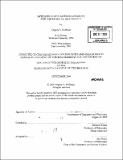| dc.contributor.advisor | Richard Holton. | en_US |
| dc.contributor.author | Hoffman, Virginia Anne | en_US |
| dc.contributor.other | Massachusetts Institute of Technology. Dept. of Linguistics and Philosophy. | en_US |
| dc.date.accessioned | 2010-05-25T20:58:19Z | |
| dc.date.available | 2010-05-25T20:58:19Z | |
| dc.date.copyright | 2009 | en_US |
| dc.date.issued | 2009 | en_US |
| dc.identifier.uri | http://hdl.handle.net/1721.1/55178 | |
| dc.description | Thesis (Ph. D.)--Massachusetts Institute of Technology, Dept. of Linguistics and Philosophy, 2009. | en_US |
| dc.description | Cataloged from PDF version of thesis. | en_US |
| dc.description | Includes bibliographical references (p. 121-124). | en_US |
| dc.description.abstract | Antidepressants and bioenhancement technologies raise special concerns - both for those who use them and those who don't - about who we are and how we should treat ourselves. In this dissertation, I confront these concerns by asking and answering two ethical questions about different forms of self-treatment. These are: 1. Is antidepressant use morally problematic insofar as it is self-objectifying?, and 2. Is bioenhancement use morally problematic insofar as it undermines self-respect? (Note: by "morally problematic," I mean "possessing a wrong-making feature," not "always wrong, all things considered.") The first two chapters focus on the former question - the question of whether antidepressant use is morally problematic insofar as it is self-objectifying. In order to answer this, I first step back, in Chapter 1, and look at the phenomenon of self-objectification generally construed. I draw from Martha Nussbaum's and Rae Langton's work on objectification to formulate my own definition of "self-objectification." I then argue that self-objectification is indeed possible, and that it assumes a number of interesting forms. The second chapter turns to the specific bioethical question of whether antidepressant use is morally problematic insofar as it is self-objectifying. I argue that the answer is "yes." Although I'm not the first to voice this particular objection to antidepressant use, I extend this previous scholarship in two principal ways. First, I draw from my definition and analysis of self-objectification in Chapter 1 to characterize exactly how antidepressant use is self-objectifying, and to pinpoint the accompanying specific moral offense. | en_US |
| dc.description.abstract | (cont.) Second, I argue in detail against Neil Levy's contention that some cases of self-objectification with antidepressants are completely permissible. In my third and final chapter, I turn to the second question: whether bioenhancement use is morally problematic insofar as it undermines self-respect. I argue that it is, while also acknowledging that there are other senses in which it, simultaneously, can promote self-respect. I offer a few options for conceptualizing this tension, and maintain that the undermining of self-respect nevertheless constitutes one reason to worry about bioenhancement technologies. | en_US |
| dc.description.statementofresponsibility | by Virginia A. Hoffman. | en_US |
| dc.format.extent | 124 p. | en_US |
| dc.language.iso | eng | en_US |
| dc.publisher | Massachusetts Institute of Technology | en_US |
| dc.rights | M.I.T. theses are protected by
copyright. They may be viewed from this source for any purpose, but
reproduction or distribution in any format is prohibited without written
permission. See provided URL for inquiries about permission. | en_US |
| dc.rights.uri | http://dspace.mit.edu/handle/1721.1/7582 | en_US |
| dc.subject | Linguistics and Philosophy. | en_US |
| dc.title | Antidepressants, bioenhancements, and the ethics of self-respect | en_US |
| dc.type | Thesis | en_US |
| dc.description.degree | Ph.D. | en_US |
| dc.contributor.department | Massachusetts Institute of Technology. Department of Linguistics and Philosophy | |
| dc.identifier.oclc | 608227767 | en_US |
